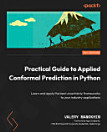Mathematical Foundations of Data Science
mar 2023 · Springer Nature
eBook
213
Páginas
reportLas valoraciones y las reseñas no se verifican. Más información
Información sobre este eBook
This textbook aims to point out the most important principles of data analysis from the mathematical point of view. Specifically, it selected these questions for exploring: Which are the principles necessary to understand the implications of an application, and which are necessary to understand the conditions for the success of methods used? Theory is presented only to the degree necessary to apply it properly, striving for the balance between excessive complexity and oversimplification. Its primary focus is on principles crucial for application success.
Topics and features:
- Focuses on approaches supported by mathematical arguments, rather than sole computing experiences
- Investigates conditions under which numerical algorithms used in data science operate, and what performance can be expected from them
- Considers key data science problems: problem formulation including optimality measure; learning and generalization in relationships to training set size and number of free parameters; and convergence of numerical algorithms
- Examines original mathematical disciplines (statistics, numerical mathematics, system theory) as they are specifically relevant to a given problem
- Addresses the trade-off between model size and volume of data available for its identification and its consequences for model parametrization
- Investigates the mathematical principles involves with natural language processing and computer vision
- Keeps subject coverage intentionally compact, focusing on key issues of each topic to encourage full comprehension of the entire book
Although this core textbook aims directly at students of computer science and/or data science, it will be of real appeal, too, to researchers in the field who want to gain a proper understanding of the mathematical foundations “beyond” the sole computing experience.
Acerca del autor
Tomas Hrycej is a pioneer in the field of artificial intelligence and neural networks, having worked in this field since the 1980s. As an example of his pioneering deeds, he worked in the 1990s at Daimler Research on self-driving cars. In his doctoral thesis, he dealt with modular learning concepts in neural networks. His most important research stations were Daimler AG, Bosch GmbH, the University of Passau and currently the University of St. Gallen. He is the author of three monographs: Neurocontrol - Towards an Industrial Control Methodology, Modular Learning in Neural Networks (both Wiley-Interscience) and Robust Control ("Robuste Regelung", Springer), as well as about 60 publications in journals and conference proceedings.
Bernhard Bermeitinger is a research assistant at the Chair of Data Science and Natural Language Processing and is currently working on his PhD in Deep Learning.
Siegfried Handschuh is a Full professor of Data Science and Natural Language Processing at the Institute of Computer Science at the University of St. Gallen, Switzerland. He received his PhD from the University of Karlsruhe (now: Karlsruhe Institute of Technology), Germany. His PhD thesis was in Collaboration with Stanford University as part of the American DARPA DAML project. Siegfried spend eight year in Ireland, where he led the Knowledge Discovery Unit at the Insight Centre for Data Analytics in Galway. He worked with multinational companies such as HP, SAP, IBM, Motorola and Elsevier Publishing. He also conducted research on the Digital Aristotle initiative, a project by Microsoft co-funder Paul Allen. He has published over 300 scientific papers and is highly cited with an h-index of 41 (according to Google Scholar). This makes him one of the top-ranked Computer Scientists in Switzerland.
Bernhard Bermeitinger is a research assistant at the Chair of Data Science and Natural Language Processing and is currently working on his PhD in Deep Learning.
Siegfried Handschuh is a Full professor of Data Science and Natural Language Processing at the Institute of Computer Science at the University of St. Gallen, Switzerland. He received his PhD from the University of Karlsruhe (now: Karlsruhe Institute of Technology), Germany. His PhD thesis was in Collaboration with Stanford University as part of the American DARPA DAML project. Siegfried spend eight year in Ireland, where he led the Knowledge Discovery Unit at the Insight Centre for Data Analytics in Galway. He worked with multinational companies such as HP, SAP, IBM, Motorola and Elsevier Publishing. He also conducted research on the Digital Aristotle initiative, a project by Microsoft co-funder Paul Allen. He has published over 300 scientific papers and is highly cited with an h-index of 41 (according to Google Scholar). This makes him one of the top-ranked Computer Scientists in Switzerland.
Valorar este eBook
Danos tu opinión.
Información sobre cómo leer
Smartphones y tablets
Instala la aplicación Google Play Libros para Android y iPad/iPhone. Se sincroniza automáticamente con tu cuenta y te permite leer contenido online o sin conexión estés donde estés.
Ordenadores portátiles y de escritorio
Puedes usar el navegador web del ordenador para escuchar audiolibros que hayas comprado en Google Play.
eReaders y otros dispositivos
Para leer en dispositivos de tinta electrónica, como los lectores de libros electrónicos de Kobo, es necesario descargar un archivo y transferirlo al dispositivo. Sigue las instrucciones detalladas del Centro de Ayuda para transferir archivos a lectores de libros electrónicos compatibles.






